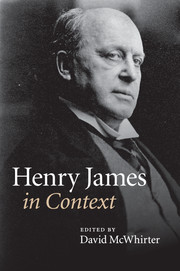Book contents
- Frontmatter
- Contents
- List of Illustrations
- Notes on Contributors
- Preface
- Abbreviations
- Chronology
- Part One Life and career, times and places
- Part Two Historical and cultural contexts
- Chapter 9 Aestheticism and Decadence
- Chapter 10 Authorship
- Chapter 11 Children
- Chapter 12 Consumer culture
- Chapter 13 Cosmopolitanism
- Chapter 14 Courtship, marriage, family
- Chapter 15 Ethics
- Chapter 16 Language
- Chapter 17 Law
- Chapter 18 Manners
- Chapter 19 Media and communication technologies
- Chapter 20 Modernism
- Chapter 21 Money and class
- Chapter 22 Museums and exhibitions
- Chapter 23 Nationalism and imperialism
- Chapter 24 Print culture
- Chapter 25 Psychology
- Chapter 26 Race
- Chapter 27 Realism and naturalism
- Chapter 28 Sexualities and sexology
- Chapter 29 Social sciences and the disciplines
- Chapter 30 Things
- Chapter 31 Time
- Chapter 32 Travel and tourism
- Chapter 33 Urbanity
- Chapter 34 Visual culture
- Chapter 35 Women and men
- Chapter 36 Work
- Part Three Reception
- Further reading
- Index
- References
Chapter 31 - Time
Published online by Cambridge University Press: 05 August 2014
- Frontmatter
- Contents
- List of Illustrations
- Notes on Contributors
- Preface
- Abbreviations
- Chronology
- Part One Life and career, times and places
- Part Two Historical and cultural contexts
- Chapter 9 Aestheticism and Decadence
- Chapter 10 Authorship
- Chapter 11 Children
- Chapter 12 Consumer culture
- Chapter 13 Cosmopolitanism
- Chapter 14 Courtship, marriage, family
- Chapter 15 Ethics
- Chapter 16 Language
- Chapter 17 Law
- Chapter 18 Manners
- Chapter 19 Media and communication technologies
- Chapter 20 Modernism
- Chapter 21 Money and class
- Chapter 22 Museums and exhibitions
- Chapter 23 Nationalism and imperialism
- Chapter 24 Print culture
- Chapter 25 Psychology
- Chapter 26 Race
- Chapter 27 Realism and naturalism
- Chapter 28 Sexualities and sexology
- Chapter 29 Social sciences and the disciplines
- Chapter 30 Things
- Chapter 31 Time
- Chapter 32 Travel and tourism
- Chapter 33 Urbanity
- Chapter 34 Visual culture
- Chapter 35 Women and men
- Chapter 36 Work
- Part Three Reception
- Further reading
- Index
- References
Summary
Both at the start of his career and in its late phase, James wrote passages in which characters ponder what it means to live in time by pondering how mechanical timepieces tell it. In the final pages of The Ambassadors, Lambert Strether ponders the end of his Parisian sojourn and uses a whimsical conceit: ‘like one of the figures of the old clock at Berne’, Strether muses, he has, at his hour, come out on one side, ‘jigged his little course’ and gone back in. In the novel James published twenty-eight years before The Ambassadors, Roderick Hudson also uses a horological simile to frame his self-understanding, as a conversation he has about ‘the possible mischances of genius’ suggests. ‘“What if the watch should run down”, [Roderick] asked, “and you should lose the key? What if you should wake up some morning and find it stopped”’ (N-1, 315).
James had many reasons for finding such human timepieces good to think with. As a chronicler of the leisure class, attentive to how hard that class’s members have (paradoxically) to work at being themselves, James would have noted how these living clocks are never at rest. Much as hands on clocks move unceasingly around the dial, his characters’ lot is always to be ‘due’ somewhere (language Strether’s friend Maria Gostrey applies to herself [Ambassadors, 79]). When James centres a book on a doomed protagonist, a Millie Theale or Hyacinth Robinson, who labours under a sentence of death, he endows time with a palpable presence, a weightiness, even as he prompts readers to listen for how time is ticking down. In his novels of adultery, another mode of time sensitivity is at issue. The protagonists’ discoveries of the illicit liaisons of others often depend on their perceiving the temporal depth that lies behind appearances, as when the narrator of The Sacred Fount, wondering whether the two people he finds sitting near each other constitute a couple, takes to puzzling over the ‘air of accepted duration’ in ‘their union’ (N-1, 513). The adultery itself, in the meantime, demands the precision in timing – the intimate knowledge of train schedules, say – that will enable the adulterers to synchronize their stolen moments.
- Type
- Chapter
- Information
- Henry James in Context , pp. 332 - 342Publisher: Cambridge University PressPrint publication year: 2010
References
- 1
- Cited by



